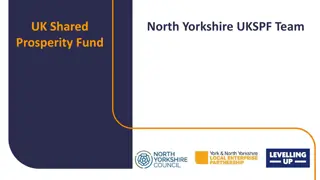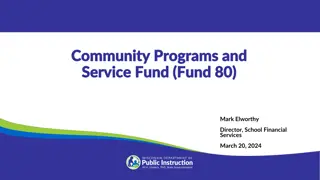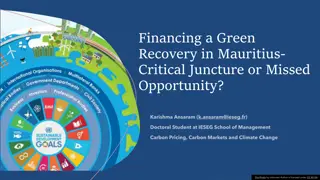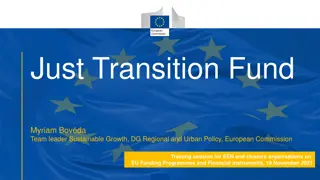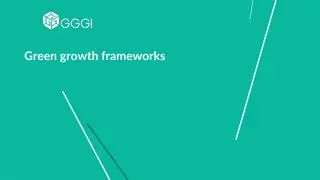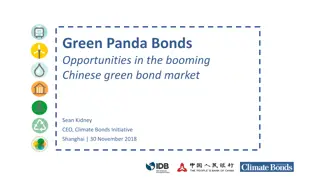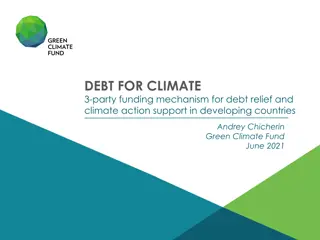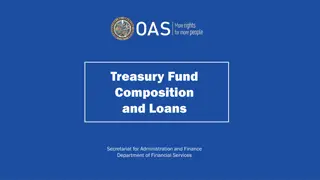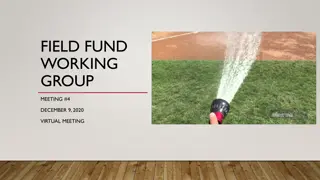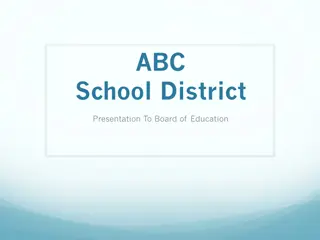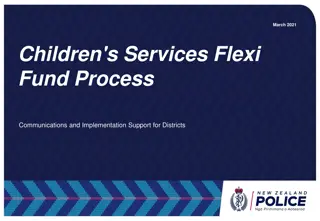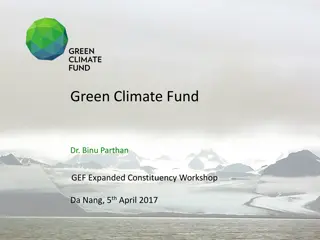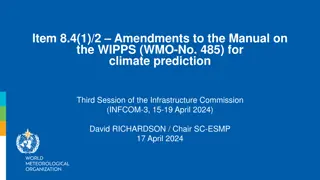Comprehensive Guide to Accessing the Green Climate Fund
Detailed guide on accessing financial resources from the Green Climate Fund, including funding opportunities, application process, and FAQs. Learn about the Fund's role, operations, and readiness support programme to empower developing countries in addressing climate change.
Download Presentation

Please find below an Image/Link to download the presentation.
The content on the website is provided AS IS for your information and personal use only. It may not be sold, licensed, or shared on other websites without obtaining consent from the author.If you encounter any issues during the download, it is possible that the publisher has removed the file from their server.
You are allowed to download the files provided on this website for personal or commercial use, subject to the condition that they are used lawfully. All files are the property of their respective owners.
The content on the website is provided AS IS for your information and personal use only. It may not be sold, licensed, or shared on other websites without obtaining consent from the author.
E N D
Presentation Transcript
A comprehensive guide on how to access the Green Climate Fund This guide is a simple, comprehensive road map for anybody who would like to access the financial resources of the Green Climate Fund. It addresses the different funding opportunities the Fund provides to help developing countries cope with climate change. Each of these sections is broken down into three parts: a short overview of GCF funding activities; a simple step by step guide telling you how to apply for funding; and a series of frequently asked questions that tease out more information about approval processes.
About the Green Climate Fund The Green Climate Fund has been given a unique role as the largest international fund dedicated exclusively to aid developing counties deal with climate change. The aim of all GCF activities is to support developing countries limit or reduce their greenhouse gas emissions, and adapt to climate change impacts. GCF has a multi-layered approach to mobilize climate finance, working directly with the public and private sectors. It is important to note that developing countries are in the driving seat of GCF s targeting and disbursement of climate finance. National Designated Authorities (NDAs) for each developing country act as the country s interface with the Fund, and are involved closely in all of GCF s funding processes.
Who operates the Fund? Day-to-day activities of the Fund are managed by the GCF Secretariat, which is staffed by specialists in climate finance. The Secretariat is headquartered in Songdo, a city within the Seoul Capital Area in South Korea. The Green Climate Fund is overseen by a Board of 24 members, comprising an equal number of individuals from developing and developed countries. They generally meet three times a year to decide on key issues guiding GCF funding activities and policies. GCF is required to report annually to the United Nations Framework Convention on Climate Change UNFCCC.
Empowering Countries: Readiness Support The Readiness and Preparatory Support Programme (the Readiness Programme) is a funding programme to enhance country ownership and access to the Fund. The Programme provides resources for strengthening the institutional capacities of NDAs or focal points and Direct Access Entities to efficiently engage with the Fund. Resources may be provided in the form of grants or technical assistance. All developing countries can access the Readiness Programme, and the Fund aims for a floor of 50 percent of the readiness support allocation to particularly vulnerable countries, including Least Developed Countries (LDCs), Small Island Developing States (SIDS), and African States
Empowering Countries: Readiness Support Up to USD 1 million per country per year may be provided under the Readiness Programme. Of this amount, NDAs or focal points may request up to USD 300,000 per year to help establish or strengthen a NDA or focal point to deliver on the Fund s requirements. The GCF Board has also allocated up to USD 3 million per country for the formulation of national adaptation plans and/or other adaptation planning processes by NDAs or focal points. This support can facilitate the development of National Adaptation Plans, which set national priorities for measures to address adaptation to climate change. Furthermore, GCF can provide capacity building for national or regional organizations (Direct Access Entities) that are nominated by their local NDAs. Support can be provided to enhance the ability of an entity to seek accreditation with the Fund.
Empowering Countries: Readiness Support Support can also be provided to build the capacities of Direct Access Entities that are already GCF accredited (post-accreditation support). In each case readiness funds will be allocated in coordination with, and with the approval of, the relevant NDAs / focal points.
Empowering Countries: Readiness Support Programme outcomes The Programme aims to support five outcomes connected to the Programme objectives: strengthening country capacity, engaging stakeholders in consultative processes, realizing direct access, providing access to finance, and mobilizing the private sector. These outcomes are contained in Section 2 of the Readiness and Preparatory Support Proposal Template (logical framework).
Empowering Countries: Readiness Support Programme outcomes 1. Strengthening country capacity This can include providing support for building the capacity of developing country NDAs or focal points. Outcomes can include strengthened coordination mechanisms led by the NDA or focal point, establishing no objection procedures to guarantee country ownership of GCF climate projects, as well as ensuring the monitoring, oversight and streamlining of climate finance.
Empowering Countries: Readiness Support Programme outcomes 2. Engaging stakeholders in consultative processes The Programme can support the development of stakeholder engagement processes in relation to country priorities. This can include support for the development of a country programme that identifies strategic priorities for engagement with GCF, and annual reviews of the GCF portfolio for that country.
Empowering Countries: Readiness Support Programme outcomes 3. Direct access The Programme supports activities to support Direct Access Entities including: the accreditation of Direct Access Entities, post-accreditation support to build capacity, and the development of work programmes for accredited entities. Readiness support is also available to help national and regional entities with in-depth assessments of their institutional capacity, fiduciary, Environmental and Social Safeguards (ESS) and gender standards to meet the GCF accreditation standards. The GCF Secretariat has developed a roster of institutions that can provide technical and capacity-building support on ESS and gender. GCF has signed a service contract with PwC, a consultancy firm, to provide technical assistance to Direct Access Entities wishing to seek GCF accreditation. This support can be provided in any region, and NDAs can access this to ensure delivery of a package of support to Direct Access Entities. Outputs from the package will include the creation of an in-depth assessment of the entity, followed by support to create an action plan to help them get ready to apply for GCF accreditation.
Empowering Countries: Readiness Support Programme outcomes 4. Access to finance The Programme can realise outcomes linked to achieving access to climate finance in developing countries. This might include supporting outcomes such as ensuring that country programmes implement high- impact priorities identified in Nationally Determined Contributions (NDCs) and other national strategies, and ensuring the alignment of funding proposals, including for adaptation, with country priorities.
Empowering Countries: Readiness Support Programme outcomes 5. Private sector mobilization Support can also cover measures to crowd in private and capital market financing for the implementation of country programmes, and enabling private sector participation in public-private partnerships. Outcomes may include engaging the private sector in country consultative processes, approving private sector funding proposals, and creating enabling environments for private sector investments.
Empowering Countries: Readiness Support How to Access Readiness Support Introduction All readiness funding requests must be initiated by a developing country NDA or focal point. The funding itself can be managed by different bodies depending on the type of support requested. These may be the NDA itself, or by a delivery partner. The delivery partner may be a direct access accredited entity, a Direct Access Entity that aims to become accredited to the Fund, or another body. There is a single application process for readiness funding.
Empowering Countries: Readiness Support 1. Submit a Readiness Proposal Applications are made by completing the readiness template and the readiness budget and procurement plan, which should be submitted to . NDA: The readiness template, along with the readiness budget and procurement plan, should be completed and submitted by the NDA or focal point with support from their delivery partner where relevant. The readiness support template guidance provides detailed information on completing the template. If the request relates to support for a Direct Access Entity (whether accredited to GCF or not) then indicate this on the template. Indicate whether the proposal requests technical assistance under GCF s service contract with PwC
Empowering Countries: Readiness Support 1. Submit a Readiness Proposal Check the eligible expenditure list in the readiness support template guidance to ensure that proposed expenditure can be covered by the Programme The Financial Management Capacity Assessment (FMCA) questionnaire should also be completed if project funding will be managed by entities that are not accredited to the GCF. DIRECT ACCESS ENTITY: Direct Access Entities must be nominated by the relevant NDA / focal point to be eligible for readiness funding. The Direct Access Entity should establish with the NDA what kind of support is being sought, and who will be the delivery partner, and this information should be included on the readiness template. DELIVERY PARTNER: Where the readiness support will not be administered by the NDA or focal point, then it can be administered by a Delivery Partner. If the Delivery Partner is not accredited to the GCF, they should complete the Financial Management Capacity Assessment (FMCA) questionnaire.
Empowering Countries: Readiness Support 2. Review of the Readiness Proposal The GCF Secretariat then reviews the request, planned activities, and the proposed budget. It also reviews the Financial Management Capacity Assessment, where applicable. NDA:In the process of its review, the GCF Secretariat may request the NDA or focal point to provide additional information, and may also propose revisions. A readiness proposal may therefore go through several drafts, based on discussions between the NDA and GCF Secretariat. After review and revision if necessary, the final proposal is submitted by the NDA or focal point to the GCF Secretariat. DIRECT ACCESS ENTITY: The Direct Access Entity may be required to provide further information, or to work with the NDA to make revisions to the readiness request, based upon discussions between the NDA and the GCF Secretariat during the review process. DELIVERY PARTNER: Assist NDA in providing further information to the GCF Secretariat as requested.
Empowering Countries: Readiness Support 3. Legal arrangements and first disbursement Following approval, legal arrangements are concluded in the form of a agreement with the grant recipient which include and incorporate the Conditions. grant Standard GRANT RECIPIENT: The grant recipient may be the Delivery Partner, the NDA or the Direct Access Entity, depending upon who will receive and manage the disbursement of funds. To make the grant agreement effective, a legal opinion on the agreement needs to be communicated to the GCF Secretariat. The grant recipient must also submit a Letter of Authorization to confirm that authorized/designated officers may submit requests for disbursements under the grant agreement. Such a letter must be accompanied with evidence to verify the signatures of the officers (for example, copy of passport personal information page).
Empowering Countries: Readiness Support 3. Legal arrangements and first disbursement The GCF Secretariat will notify the NDA or focal point and the grant recipient (if this is not the NDA or focal point) on the effectiveness of the legal arrangements. This date will generally be at the start of the relevant quarter, i.e. 1 January, 1 April, 1 July, or 1 October. When the legal arrangements come into force and effect, the GCF Secretariat releases the first tranche of funding. Readiness resources are received to the bank account of the signing party of the grant agreement. Alternatively, approved proposals may be covered under executed Readiness Framework Agreements with Delivery Partners.
Empowering Countries: Readiness Support 4. Implementation, monitoring and reporting GRANT RECIPIENT: Readiness activities are implemented in line with specifications of the agreed work plan and budget. A financial management system should be maintained, with separate accounts (i.e. bank account or ledger) and records for readiness support. The grant recipient reports to GCF, on an agreed schedule, against the work plan, budget, and agreed targets; and proposes potential revisions or adaptations, as required, to future implementation plans. Financial statements should be prepared in accordance with consistently applied accounting standards, audited on an annual basis by reputable independent auditors, and furnished to the GCF Secretariat in accordance with the reporting requirements set in the grant agreement. Reports submitted to the GCF Secretariat will be disclosed on the GCF website in accordance with the GCF interim disclosure policy.
Empowering Countries: Readiness Support 5. Completion and grant closure GRANT RECIPIENT: Towards the end of the readiness grant implementation period, the GCF Secretariat and the grant recipient take stock of achievements and progress, and agree on next steps. When relevant, GCF proceeds to close the readiness grant.
Getting Accreditation What are Accredited Entities? GCF mobilizes climate finance by working through a wide range of organizations. Organizations seen to have specialized capacities in driving climate action may apply to become GCF Accredited Entities. They can be private, public, non- governmental, sub-national, national, regional or international bodies. They should have clear, detailed and actionable climate change projects or programmes to present to GCF progressing mitigation and adaptation. They must also meet GCF standards based on financial standards, environmental and social safeguards, and gender. Accredited Entities develop funding proposals to be considered by the Fund and oversee, supervise, manage and monitor their respective GCF-approved projects and programmes.
Getting Accreditation What are Accredited Entities? There are two types of GCF Accredited Entities, based on access modalities: Direct Access Entities and International Access Entities. Direct Access Entities are sub-national, national or regional organizations that need to be nominated by developing country National Designated Authorities (NDAs) or focal points. Organizations nominated to become Direct Access Entities may be eligible to receive GCF readiness support. This funding is designed to help organizations in developing countries prepare to become Accredited Entities, as well as helping those which have already been accredited to strengthen their organizational capacities.
Getting Accreditation What are Accredited Entities? International Access Entities can include United Nations agencies, multilateral development banks, international financial institutions and regional institutions. GCF considers these organizations to have the wide reach and expertise to handle a variety of climate change issues, including ones that cross borders and thematic areas. International Access Entities do not need to be nominated by developing country NDAs / focal points. (approved Accredited Entities here.) For organizations that are not Accredited Entities, there are also ways to engage with the GCF. These may include, but are not limited to: partnering with an Accredited Entity on implementing its approved GCF project; co-financing projects with an already Accredited Entity; and as a readiness delivery partner, provided that the entity can demonstrate relevant expertise, experience and ability to implement projects.
Step by Step: How to Become an Accredited Entity? Self-assessment check Before starting the application process, organizations can assess whether they meet the basic requirements to become Accredited Entities. They can do this by considering a series of questions through GCF s online assessment tool. This online questionnaire helps organizations assess: whether they are considered to have full legal capacity to undertake activities funded by the Green Climate Fund, what their institutional arrangements are - including their systems, policies, procedures and guidelines, their track record considering whether their systems, policies, procedures and guidelines have been implemented systematically. The Self-Assessment Tool helps organizations save time and expenses by deciding at an early stage whether they meet GCF accreditation requirements. The Self-Assessment Tool is a guide only, and does not guarantee later GCF accreditation. Organizations considering applying for accreditation do not need to pay the accreditation application fee at this stage. Once an organization is confident it has the credentials to become an Accredited Entity, it can start the three-stage application process. Entities applying for accreditation should have been operating for at least three years.
Step by Step: How to Become an Accredited Entity? Prepare an Application All Direct Access Entities need to be nominated by a developing country NDA / focal point. International Access Entities can seek GCF accreditation directly without nomination by a developing country National Designated Authority / focal point. NDA / focal points nominate Direct Access Entity applicants by filling out this template and sending it to GCF at this email address: accreditation@gcfund.org All accreditation applicants need to apply to join GCF s Online Accreditation System (OAS). They do so by filling out this document Once the complete form is accepted by the Secretariat, applicants will receive a log-in to access GCF s online application system: They will be asked to fill out this online application form within the OAS. This is the main part of applying for accreditation. The application form contains detailed guidance on how to fill it out.
Step by Step: How to Become an Accredited Entity? Prepare an Application Organizations submit their application in the OAS after they have completed the online accreditation application form. Application fees are paid at this point. This amount varies according to the fiduciary functions and the size of financing for project or programmes the accreditation applicant is proposing to receive GCF funding. Some of the fees will be waived for sub-national, national and regional organizations based in Small Island Developing States (SIDS) and Least Developed Countries (LDCs) for certain financing amounts.
Step by Step: How to Become an Accredited Entity? Application Stage I: Checking an application Once application fees are received, the GCF Secretariat reviews the application to ensure the mandate of the accreditation applicant aligns with GCF s mandate and objectives in targeting climate finance, and in a manner that can contribute to developing country programming priorities with the GCF. The Green Climate Fund has identified eight strategic impact areas for delivering major mitigation and adaptation benefits. (More details here) The GCF Secretariat also checks whether the accreditation applicant has provided sufficient information about the applicant s systems, policies, procedures and guidelines related to safeguarding projects against financial, environmental, social and gender risks and impacts. The GCF Secretariat will also check whether information on the applicant s track record of applying the systems, policies, procedures and guidelines have been provided. The GCF Secretariat may ask applicants questions about their accreditation application with the aim to have a complete application. This often involves considerable back and forth correspondence between the applicant and the GCF Secretariat.
Step by Step: How to Become an Accredited Entity? Review Application Stage II: Reviewing and recommending to GCF Board Once the GCF Secretariat is satisfied that application completeness requirements are met, it passes on submitted documents to the Accreditation Panel. This group of six accreditation experts provides an independent appraisal of the application, focusing on whether the accreditation applicant meets the GCF standards it is applying for. In 2017, applications during Stage II will be checked by the Accreditation Panel in accordance with the GCF Board s decision to prioritize particular applications At this point, the Accreditation Panel may ask applicants to provide clarifications, while liaising with the GCF Secretariat.
Step by Step: How to Become an Accredited Entity? Review Application Stage II: Reviewing and recommending to GCF Board The GCF Secretariat and the Accreditation Panel then send their recommendations to the GCF Board. This recommendation will include the GCF Secretariat s assessment from the Stage I check, and the recommendation by the Accreditation Panel regarding accreditation and the accreditation criteria. The Accreditation Panel may also, in cases where it finds gaps in the accreditation applicant meeting the GCF standards it is applying for, recommend conditions of accreditation. For example, conditions may be prior to first disbursement for the amendment or development of a policy or procedure, or an on-going condition applied to all GCF- funded projects regarding information to be provided or additional monitoring requirements. If the application is complete and does not require follow up questions, the duration of the review process by both the GCF Secretariat and the Accreditation Panel could be a minimum of six months, or three months for fast-track applications. The GCF Board, which generally meets three times a year, makes the final decision about whether to accredit the entity. The GCF Secretariat informs the applicant entity about the result of the GCF Board decision.
Step by Step: How to Become an Accredited Entity? Legal Arrangement Stage III: Legal Arrangements The approved Accredited Entity will then sign an Accreditation Master Agreement (AMA) with GCF. AMAs are legal agreements that set out the terms and conditions for an entity s use of GCF resources. They formalise the Accredited Entity s accountability in carrying out GCF-approved projects appropriately. For individual GCF-funded activities approved by the Board, the Accredited Entity enters into a Funded Activity Agreement (FAA) for each approved project, which contains project-specific terms. Accredited Entities are required to carry out a yearly self-assessment of their operations to assess whether they continue to meet the accreditation standards they have applied for. Accredited Entities are also required to submit yearly progress reports about their management of GCF-approved climate finance projects or programmes. Accredited Entities will need to re-apply to retain their status every five years. GCF is currently working on procedures to guide the re-accreditation process.
Project Preparation The Project Preparation Facility (PPF) supports Accredited Entities (AEs) in project and programme preparation. It is especially targeted to support direct access entities, and micro-to- small size category projects. A total of USD 40 million has been made available for the initial phase of the PPF, with each request subject to a cap of USD 1.5 million. Support will be commensurate to the funding proposal being developed, and to the activities in the PPF application. If approved, support is granted in the form of grants and repayable grants, while equity may be considered for private sector projects. Funding proposals developed with the PPF should be submitted to the GCF Board within two years of the approval of a PPF request. There are many phases in project preparation, from early stages of project identification, concept development and establishing the enabling environment, to mid- and late-stage processes including project due diligence and project structuring. With each phase having different needs, it would be important to review the main outstanding requirements of project development as well as to assess the type of support the project/programme will require.
Project Preparation PPF support is limited to covering the following activities: 1. Pre-feasibility and feasibility studies, as well as project design; 2. Environmental, social and gender studies; 3. Risk assessments; 4. Identification of programme/project-level indicators; 5. Pre-contract services, including the revision of tender documents; 6. Advisory services and/or other services to financially structure a proposed activity; 7. Other project preparation activities, where necessary, provided that sufficient justification is available. The PPF application must include a clear paragraph explaining how the underlying project fits in with the country s national priorities and ensures full country ownership. It is therefore highly recommended that the accredited entities consult with the respective national designated authority (NDA) or focal point on the project or programme concept at an early stage.
How to Receive Project Preparation Support 1. PPF application development Project Preparation Facility requests are developed by the accredited entity in collaboration with the respective NDA/ focal point, and with support from the GCF Secretariat. 2. Submit a PPF application Applications are submitted by the Accredited Entity, using the Project Preparation Funding application form. It is optional to first submit a concept note before applying for PPF support. If a concept note or draft funding proposal for the underlying project has already been submitted to the GCF, the last section of the PPF proposal template can be left blank. Submitted documents comprise PPF application No objection letter for PPF from the NDA or focal point Project information (in the form of a concept note, or a funding proposal, or a completion of the annex in the PPF application) Applications can be sent to the GCF Secretariat at ppf@gcfund.org
How to Receive Project Preparation Support 3. Review and Approve The GCF Secretariat reviews the request and the Executive Director may decide to approve the request on the basis of the following criteria: Assessment against the GCF investment criteria Justification of needs Consistency with relevant GCF policies.
How to Receive Project Preparation Support 4. Grant Agreement and Disbursal Following approval of a PPF request, legal arrangements are concluded in the form of a grant agreement with the grant recipient which include and incorporate the Standard Conditions. To make the grant agreement effective, a legal opinion on the agreement needs to be communicated to the GCF Secretariat. The grant recipient must also submit a Letter of Authorization to confirm that authorized/designated officers may submit requests for disbursements under the grant agreement. Such a letter must be accompanied with evidence to verify the signatures of the officers (for example, copy of passport personal information page). The GCF Secretariat will notify the grant recipient on the effectiveness of the legal arrangements. This date will generally be at the start of the relevant quarter, i.e. 1 January, 1 April, 1 July, or 1 October. When the legal arrangements come into force and effect, the GCF Secretariat releases the first tranche of funding. PPF resources are received to the bank account of the signing party of the grant agreement.
How to Receive Project Preparation Support 5. Implementation, Monitoring and Reporting The AE will be responsible for the implementation of the activities upon approval. The PPF activities implemented by the AE will be subject to the monitoring and evaluation procedures of the GCF, and the frequency of reporting will be agreed in the PPF request approved by the GCF. Each approved PPF request will be disclosed on the GCF website upon approval, and the Secretariat will report at each Board meeting on the pipeline of PPF requests received, approved and under implementation.
How to Receive Project Preparation Support 6. Submission of project proposal to the Board Projects which have been developed using funding from the PPF should be submitted to the Board within two years from the approval date for the PPF request, unless there is sufficient justification for an extension to this deadline.
Funding Project GCF does not implement projects directly itself, but through partnerships with Accredited Entities. This chapter explains the process of bringing a project proposal to GCF, from initial submission through to Board approval. The Fund utilizes a variety of financial instruments to realise these projects. These include grants, concessional debt financing, equity and guarantees. GCF private sector support includes assisting entities to tap financial markets. Accredited Entities comprise the core of GCF s funding proposal cycle. They are responsible for presenting funding applications to GCF, and then overseeing, supervising, managing and monitoring the overall GCF-approved projects and programmes.
Project Funding It is not necessary for Accredited Entities to act as the direct implementer of funding proposals. Executing Entities can also do this on behalf of Accredited Entities by channelling funds and carrying out the funded activity. In these cases, Accredited Entities will continue to be important as they maintain oversight of Executive Entities GCF-related activities. GCF project approval is built on the need to support developing country priorities. Developing countries nominate National Designated Authorities (NDAs) or focal points to act as the point of communication with GCF. Every project the GCF Board agrees to fund must be endorsed, expressed via a no objection letter, by the NDA or focal point. GCF recognises developing countries may face capacity constraints in developing climate finance proposals. That is why it has established the Project Preparation Facility to provide financial support to help Accredited Entities prepare projects and programmes. The facility is specially targeted to support Direct Access Entities, and micro-to-small size category projects.
Funding Projects: Generation of Funding Proposal Accredited Entities develop funding proposals, in close consultation with NDAs or focal points, based on the differing climate finance needs of individual developing countries. Accredited Entities can also respond to Requests for Proposals issued by GCF to fill current gaps in climate financing. In issuing some Requests for Proposals, GCF may accept proposals from entities it has not yet accredited. However, non-accredited entities will have to team-up with Accredited Entities when formally submitting funding proposals to GCF. Entities that submit proposals through the Requests for Proposals can be prioritized when applying for accreditation.
Funding Projects: Request for proposal The GCF Board has established several supporting programmes to issue Requests for Proposals. 1. Micro- Small-, and Medium-Sized Enterprises Pilot Programme The micro- , small-, and medium-sized enterprises pilot programme was established by the GCF Board in 2016 as part of the Private Sector Facility. The programme aims to support micro- , small-, and medium-sized Enterprises in addressing mitigation and adaptation challenges. Further information on the micro- , small-, and medium-sized enterprises pilot programme can be found on the GCF website here. 2. Enhancing Direct Access The GCF Board approved an initial allocation of USD 200 million for 10 pilots funding proposal adopting Enhance Direct Access implementation modalities. Further details can be found on Enhancing Direct Access FAQ (Frequently Asked Questions) and on the GCF website here. 3. Mobilising Funding at Scale Pilot Programme The GCF Board has allocated up to USD 500 million for the Mobilising Funding at Scale Pilot Programme to identify innovative, high-impact projects and programmes that mobilize private sector investment in climate change activity. Details about how to access this Pilot Programme will be issued by the Fund once the modalities for the Programme have been approved.
Funding Projects: Simplified Approval Process Concept notes for some small-scale projects may also be submitted for consideration under the Simplified Approval Process (SAP). Under the SAP, the documentation and review processes for bringing projects or programmes from conception to implementation are reduced and simplified. Accredited Entities, National Designated Authorities (NDAs) or Focal Points and their partners may choose to submit concept notes under the SAP if the project or programme meet three main eligibility criteria: Ready for scaling up and having the potential for transformation, promoting a paradigm shift to low-emission and climate-resilient development; A request for financing to the GCF of up to USD 10 million of the total project budget; and The environmental and social risks and impacts are classified as minimal to none.
Funding Projects: How to Submit A Funding Proposal Submitting a concept note The concept note is a document which provides basic information about a project or programme. It also allows Accredited Entities a chance to seek feedback from the GCF Secretariat about whether their proposal matches the Fund s objectives and mandate. Concept notes for some small-scale projects that meet eligibility criteria may also be considered for the Simplified Approval Process (SAP). GCF Secretariat feedback about submitted concept notes does not represent a commitment to provide financial resources to support the project. The Accredited Entity must inform the NDA or focal point about its submission of a concept note to GCF. A guide to how to fill in the Concept Note is available here. Download the Concept Note template here, while the SAP Concept Note template is available here. There are a number of steps in the submission and appraisal of funding proposals. Note that these steps may change over time as GCF refines its approval processes.
Funding Projects: How to Submit A Funding Proposal 1. Submitting a funding proposal to the GCF Secretariat It is standard practice for Accredited Entities to submit funding proposals to GCF. In some cases, however, GCF may issue a Request for Proposals allowing submission by entities that are not yet accredited to GCF. In these cases, the accreditation application of the entity will be considered alongside the funding proposal. Funding proposals that are submitted to GCF are subject to a rigorous review process, culminating in a decision by the GCF Board as to whether to support the project. More details about what information is necessary to develop a funding proposal and the template can be found here. Funding proposals must include an Impact Assessment to ensure the project meets the Environmental and Social Standards (ESS), including gender, of the GCF. This requires extensive consultation with those who would be affected by the project, and must be published 120 days before the Board decision for category A (high risk) projects and 30 days for category B (medium risk) projects.
Funding Projects: How to Submit A Funding Proposal 1. Submitting a funding proposal to the GCF Secretariat As country ownership is essential, the Accredited Entity needs to submit a no objection letter signed by the NDA of the relevant developing country associated with the funding proposal. The no objection letter should be submitted within 30 days of the proposal itself, but can be separate from the proposal. GCF Secretariat carries out a receipt and completeness check The GCF Secretariat first assesses the submitted funding proposal and the technical specifications alongside the documents that need to accompany it. At this stage, the GCF Secretariat may contact the Accredited Entity to discuss the proposal and seek to strengthen the application in advance of further, more detailed review.
Funding Projects: How to Submit A Funding Proposal 2. GCF assesses the funding proposal GCF SECRETARIAT Following the initial completeness check, the GCF Secretariat undertakes a more detailed assessment of the project proposal, including assessing how it matches GCF investment criteria. The Secretariat also assesses compliance with GCF policies, including, but not limited to: Fiduciary standards Risk management Environment and Social Standards (ESS) Monitoring and Evaluation criteria Gender policy Legal standards Once the proposal has passed this initial review stage, the GCF Secretariat will pass on its assessment, along with the submitted proposal and supporting documents, to the Independent Technical Advisory Panel (ITAP).
Funding Projects: How to Submit A Funding Proposal 2. GCF assesses the funding proposal INDEPENDENT TECHNICAL ASSESSMENT The Independent Technical Advisory Panel (ITAP) assesses the funding proposals against the six GCF investment criteria. ITAP is an independent technical advisory body made up of six international experts: three from developing countries and three from developed countries. ITAP can add conditions and recommendations to the funding proposal at its discretion. At this point, ITAP may ask Accredited Entities to provide clarifications, while liaising with the GCF Secretariat.
Funding Projects: How to Submit A Funding Proposal 3. GCF Board Decision The GCF Secretariat submits a funding proposal package to the GCF Board. This consists of the funding proposal, documents which are required to support the proposal, a no objection letter signed by the NDA, and the GCF Secretariat and ITAP assessments. Accredited Entities may be requested to provide additional clarification about their funding proposal - based on the GCF Secretariat and ITAP assessments. The GCF Board generally meeting three times a year - considers the proposal, with a unanimous decision required. The GCF Board can choose one of three possible decisions: Approve funding Approve funding with the conditions and recommendations that modifications are made to the funding proposal Reject the funding proposal
Funding Projects: How to Submit A Funding Proposal 4. Legal Arrangement Following GCF Board approval of a funding proposal, the GCF Secretariat negotiates with the Accredited Entity in order to sign a Funded Activity Agreement. The Funded Activity Agreement lays the groundwork for the implementation phase of the project or programme.
Funding Projects: Project Implementation The first step in project implementation is an agreement between GCF and the implementing Accredited Entity on the necessary legal arrangements to get the funds flowing, called a Funded Activity Agreement (FAA). GCF then begins transferring financial assistance to the Accredited Entity in the form of a loan, grant, equity, or guarantee - depending on the nature of the approved project. Typically, GCF completes a series of financial disbursements during the life of the project. This allows GCF to assess the impacts of the climate finance initiatives it supports and monitor its efficient and effective delivery. GCF assessments are designed to make sure the projects are effective in dealing with climate change, and do not cause negative effects where the initiatives are targeted. In implementing projects, Accredited Entities should comply with grant conditions and covenants, while also observing the implementation schedule of the project. This will help to ensure timely implementation by the Accredited Entities and enable additional disbursements by GCF. GCF maintains an overview of project progress through its requirement for Accredited Entities to produce independent evaluation reports at regular intervals. These include one at the mid-point of the project, and a final evaluation after the project has closed.











